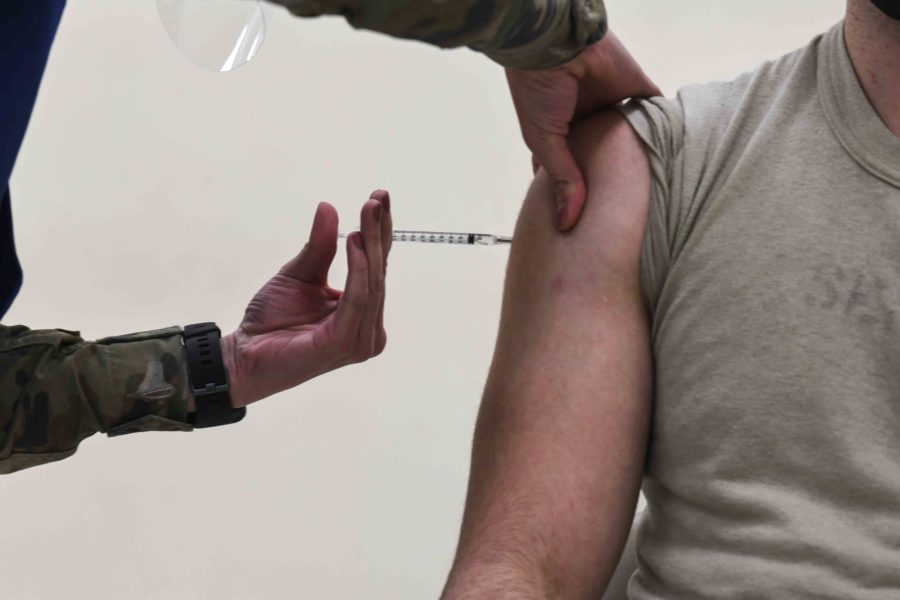Currently serving Airmen and Guardians who sought exemptions from the Pentagon’s COVID-19 vaccine mandate will see those actions reversed and records erased, a new memo from Secretary of the Air Force Frank Kendall states.
“The DAF will remove adverse information from records of those currently serving service members who sought an exemption on religious, administrative, or medical grounds and who received adverse actions solely due to their refusal to take the vaccine,” the Air Force stated in a Feb. 24 press release.
Letters of admonishment, counseling, or reprimand will be rescinded; nonjudicial punishments “issued solely for vaccine refusal” will be set aside; referral performance reports issued “solely for vaccine refusal after requesting an exemption will be removed from personnel records;” adverse actions related to vaccine refusal detailed in promotion records will be “corrected” or redacted; and involuntary discharge proceedings related to vaccine refusal that are not yet complete will be terminated.
It is unclear how many service members remain Active Duty who are affected by the recent memo. Nor is it clear how long it will take for records to be corrected. The Air Force said service members still on Active, Guard, or Reserve status will not have to initiate any actions for their records to be updated.
“Commanders at all levels must ensure that associated guidance derived from the mandate is rescinded,” Kendall wrote.
As of October 2022, the most recent data available, 97.5 percent of the Department’s Total Force of 497,000 Active Duty Air Force and Space Force, Air Guard, and Air Force Reserve members—were vaccinated against COVID-19. That data indicated nearly 99 percent of Active-duty personnel had been vaccinated.
While Kendall’s memo dispenses with Air Force’s punitive actions for those who sought exemptions, COVID-19 vaccination status can still impact assignments or deployments for them, especially if it presents an issue with another country’s laws.
The Department of Defense officially rescinded its vaccine mandate Jan. 10. On the same day Kendall released his memo, Secretary of Defense Lloyd J. Austin III issued a memo directing all military departments to issue new guidance to comply with the new DOD policy by Mar. 17.
The Department of the Air Force is canceling all religious accommodation requests related to COVID-19 vaccines, as the issue is now moot. If a service member has other religious accommodation requests related to other mandated vaccines, they must resubmit the request, the Air Force said.
Not a Clean Sweep
However, the slate is not entirely wiped clean for affected service members if there are other issues on their record. Kendall’s memo states that the new policy reversals are solely in response to actions taken for not receiving a COVID-19 vaccine. If a nonjudicial punishment was issued partially for refusing the vaccine and partly for some other transgression, parts unrelated to the vaccine will be reassessed. If a performance report addresses misconduct other than a refusal to get vaccinated, the report will redact only the portion related to the COVID-19 vaccine and be reevaluated.
“At the time the actions were taken, they were appropriate, equitable, and in accordance with valid lawful policy in effect at the time; however, removal of those actions is now appropriate in some circumstances,” Kendall wrote.
According to April 2022 Congressional testimony, the Air Force had separated 287 Airmen for refusing to get the COVID-19 vaccine. Just shy of 98 percent of those received general discharges under honorable conditions. The Space Force had not discharged anyone for refusing to get the vaccine at the time. The 287 Airmen separated represented roughly 0.05 percent of all Active, Reserve, and Guard service members. According to plaintiffs in a class action lawsuit against the Department of the Air Force, there are around 10,000 unvaccinated Total Force personnel. An unknown number of service members left voluntarily to avoid the vaccination requirement.
The Air Force granted the fewest honorable discharges of all services for refusing the vaccine, which can have implications for the kinds of benefits separated Airmen can receive. A service member that receives a general discharge, as nearly all Airmen did, can usually receive medical benefits from the VA, but they do not have access to G.I. Bill educational benefits.
Kendall’s latest memo did not detail what the Air Force plans to do with separated service members, such as possibly allowing them to reapply to return to service.
One issue that appears to be off the table is providing back pay for any separated service member.
“We are not pursuing, as a matter of policy, back pay for those who refused the vaccine,” Pentagon Press Secretary Air Force Brig. Gen. Patrick S. Ryder told reporters in January. “At the time that those orders were refused, it was a lawful order.”

